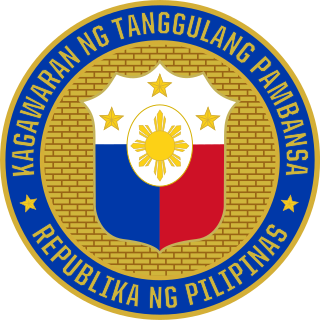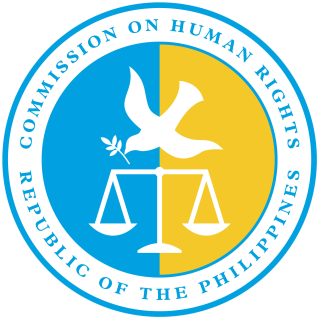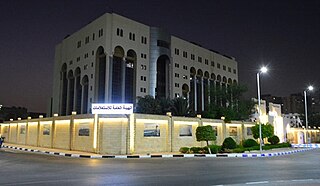Related Research Articles

In the Philippines, regions are administrative divisions that primarily serve to coordinate planning and organize national government services across multiple local government units (LGUs). Most national government offices provide services through their regional branches instead of having direct provincial or city offices. Regional offices are usually but not necessarily located in the city designated as the regional center.

The coat of arms of the Philippines features the eight-rayed sun of the Philippines with each ray representing the eight provinces which were placed under martial law by Governor-General Ramón Blanco Sr. during the Philippine Revolution, and the three five-pointed stars representing the three major island groups of Luzon, the Visayas, and Mindanao.

The ombudsman of the Philippines is an ombudsman responsible for investigating and prosecuting Philippine government officials accused of crimes, especially graft and corruption.

The Cabinet of Egypt is the chief executive body of the Arab Republic of Egypt. It consists of the Prime Minister and the cabinet ministers.

The Department of National Defense is the executive department of the Philippine government responsible for guarding against external and internal threats to peace and security in the country. The Department of National Defense exercises executive supervision over the Armed Forces of the Philippines (AFP), the Office of Civil Defense (OCD), the Philippine Veterans Affairs Office (PVAO), the National Defense College of the Philippines (NDCP), the Government Arsenal (GA), and Veterans Memorial Medical Center (VMMC). It is also responsible for disaster preparation and management in the country.

The Department of Trade and Industry is the executive department of the Philippine government responsible for the advancement, promotion, governance, regulation, management and growth of industry and trade.
The legislative district of San Juan–Mandaluyong was the combined representation of the Metropolitan Manila municipalities of Mandaluyong and San Juan in the Regular Batasang Pambansa (1984–1986) and the lower house of the Congress of the Philippines (1987–1995).

The National Economic and Development Authority is an independent cabinet-level agency of the Philippine government responsible for economic development and planning. It is headed by the president of the Philippines as chairman of the NEDA board, with the Secretary of Socioeconomic Planning as vice-chairman. A number of Cabinet members, the Governor of the Bangko Sentral ng Pilipinas, the Chairperson of the Metropolitan Manila Development Authority, the Chief Minister of Bangsamoro, the Secretary of Information and Communications Technology, the Chairman of the Subic–Clark Area Development Corporation, and the National President of the Union of Local Authorities of the Philippines are members of the NEDA Board.

The Ministry of Culture of Egypt is a ministry responsible for maintaining and promoting the culture of Egypt.
The legislative districts of Basilan are the representations of the province of Basilan in the various national legislatures of the Philippines. The province is currently represented in the lower house of the Congress of the Philippines through its lone congressional district.

The legislative districts of Sultan Kudarat are the representations of the province of Sultan Kudarat in the various national legislatures of the Philippines. The province is currently represented in the lower house of the Congress of the Philippines through its first and second congressional districts.

The Philippines' National Food Authority, is an agency of the Philippine government under the Department of Agriculture responsible for ensuring the food security of the Philippines and the stability of supply and price of rice, the Philippines' staple grain.

The Commission on Human Rights (CHR) is an independent constitutional office created under the 1987 Constitution of the Philippines, with the primary function of investigating all forms of human rights violations involving civil and political rights in the Philippines.

The Ministry of Information was the ministry in charge of state-owned media and press in Egypt, and for regulating the practices through affiliate agencies between 1971 until its latest dissolution in 2021.

Ministry of Housing, Utilities and Urban Communities (MoHUUC) is responsible for addressing Egypt's housing issues, with a mandate to provide public housing, drinking water and wastewater treatment utilities, and the planning and subdivision of new urban communities. It is headquartered in Cairo since its inception in 1961, and administers the nation's largest real estate developer, the New Urban Communities Authority, and the largest contractor, the Arab Contractors.

The East Avenue Medical Center (EAMC) is a government-owned tertiary general hospital located in Central, Quezon City, Philippines.

The State Information Service is an Egyptian government agency affiliated to the Egyptian Presidency. It is the official media and public relations apparatus of the Egyptian state, with a number of local and international offices, and it's responsible for regulating the affairs of foreign press and media correspondents in Egypt.

The National Irrigation Administration (NIA) (Filipino: Pambansang Pangasiwaan ng Patubig) is a Philippine government-owned and controlled corporation primarily responsible for irrigation development and management in the country.
The 1977 Southern Philippines autonomy plebiscite was a plebiscite to create an autonomous region held on April 17, 1977 in parts of Mindanao and Palawan in the Philippines.
References
- ↑ "Presidential Decree 469/1986" (PDF). The Official Gazette. 1986.
- ↑ "Presidential Decree 380/1993" (PDF). The Official Gazette. 1993.